TODAY CQN brings you the seventeenth EXCLUSIVE extract from Alex Gordon’s book, ‘CELTIC: The Awakening’, which was published by Mainstream in 2013.
The book covers the most amazing decade in the club’s history, the Sixties, an extraordinary period when the team were transformed from east end misfits to European masters.
MARCH 1969 kicked off on the opening day of the month with a Scottish Cup quarter-final tie against St.Johnstone in Glasgow. The Perth side maintained the capacity to make life difficult for Celtic. Manager Willie Ormond would often convert his centre-half Bill McCarry – known as Buck – to centre-forward in an attempt to unsettle Billy McNeill.
Buck was a hulking brute of a player whose first touch of the ball was rarely first class. He made little pretence of being in any way delicate during the performance of his duties. In short, he was a battering ram. There were a few of his ilk around at the time. Airdrie had Davie Marshall, Stirling Albion possessed Jim Kerray, Morton had Per Bartram and Rangers, of course, could call on Colin Stein and Alex Ferguson.
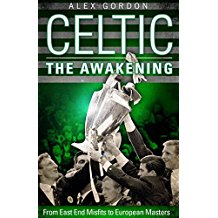
All five, plus McCarry, weren’t at all interested in the finer arts of the game. However, it must be said they were fearless in their pursuit of goals and McNeill must have known he was in for another hectic afternoon when he saw the 6ft-plus muscle-bound frame of McCarry squeezed into the No.9 shirt. It took a goal from the elusive Chalmers to settle the tie 3-2 in Celtic’s favour, but it was a distinctly edgy performance against a spirited Saints side.
Stein was already preparing for the visit of AC Milan for the second leg of their European Cup-tie. Years later I talked to Bobby Murdoch about his recollection of the game and he had a surprise revelation that was an interesting insight into the workings of his manager’s mind.
‘Big Jock knew the Italians would stick a man on me,’ said one the finest exponents of passing a ball it has ever been my privilege to witness. ‘He also realised I wasn’t the quickest at getting away from an opponent. I had always maintained you should let the ball do the work. I reasoned why run sixty yards with the ball when you can pass it there in seconds. That was what I put into practice in every game, but Jock worried about me being stifled in this tie. The Italians, of course, were masters at nullifying their opponents’ assets. Inter Milan had tried it with Burgnich on Johnstone in Lisbon, but it hadn’t worked. Jinky, though, possessed an acceleration I didn’t have and could skip away from players.
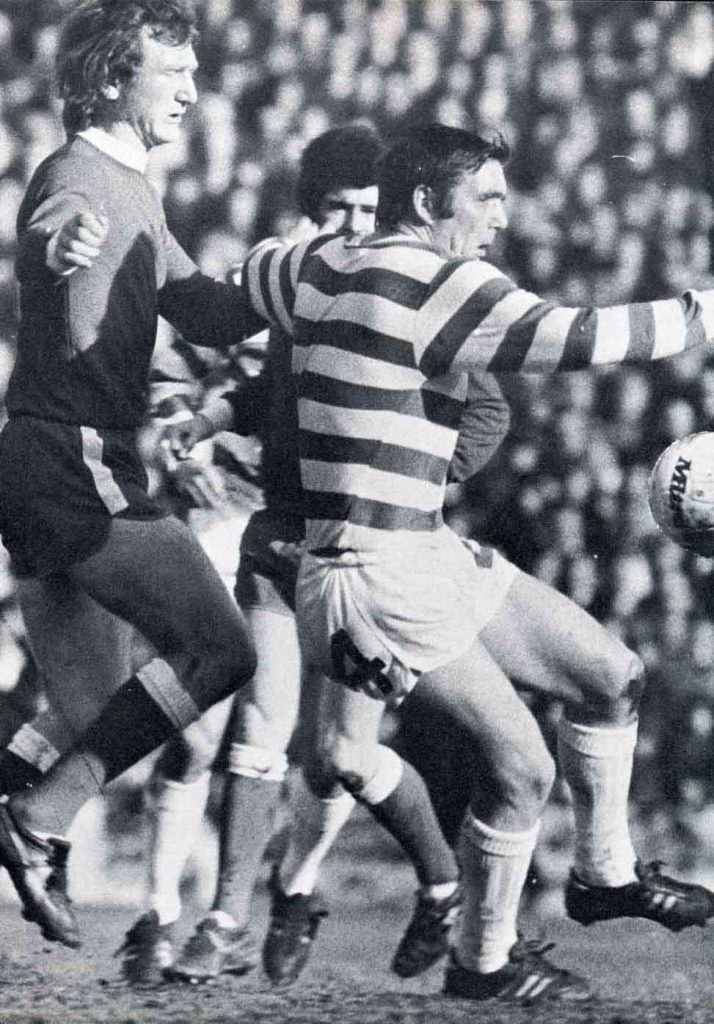
KEY MAN…Bobby Murdoch was part of Jock Stein’s masterplan against AC Milan.
‘Big Jock agonised over what to do next. He wouldn’t leave me out, that much was certain. So what was the best way to get the most out of me with an Italian breathing down my neck? The ploy he came up with surprised even me. He had the big magnetic board on the wall at the Seamill Hotel again and he pointed to No.4. “Bobby,” he said, “I’ve got a new role for you for this game. I want you to mark Gianni Rivera.”
‘The room went quiet. “Pardon, Boss?” I asked. “If you stick to Rivera that will take two Italians out of the game. Your guy won’t leave you and you won’t leave Rivera. What do you think?” Big Jock would often ask for a player’s input before waving away their suggestion and saying, “Naw, this is the way we’ll do it.” I said, “I’ve never marked a player before, Boss. Do you think it’ll work?” No hesitation. “I know it will. The Italians won’t realise what’s going on until it’s too late, take my word for it.” And it might have worked, too.’
On 12 March, Stein fielded eight of his Lisbon Lions in this line-up: Fallon; Craig, McNeill, Clark and Gemmell; Murdoch and Brogan; Johnstone, Wallace, Chalmers and Hughes. With a full house of 75,000 looking on, Murdoch, wearing the No.10 shorts, ambled over to a somewhat non-plussed Rivera, AC Milan’s main playmaker, at the start of the game. Sure enough, Murdoch’s designated companion for the next ninety minutes went with him. Wallace was asked to play a bit deeper to fill the void left by Murdoch and Johnstone filtered in and out from the right throughout the occasion.

It was an intriguing plan. It was blown apart in only eleven minutes, though. Jim Craig took a quick throw-in midway on the right. Skipper McNeill looked surprised as the ball came in his direction, obviously thinking his full-back would heave the ball down the line. Craig thought it better to keep possession and chucked the ball to McNeill. On a slippery surface, the centre-half failed to control the ball, Pierino Prati, lurking close by, seized on it and, with incredible pace considering the tricky underfoot conditions, sped off in the direction of the Celtic goal. Fallon, without a defender between him and the AC Milan winger, seemed unsure of what to do. Advance? Or stay put? He came, stopped and Prati put him out of his misery by sweeping the ball past his outstretched right foot.
‘That was the ultimate sickener,’ said Gemmell. ‘All that preparation and the anticipation and one mistake let them in. I believe that was their only effort on target at our place. We had done the hard work in Milan and were then undone in Glasgow. One slip, one goal, one dream kaput. As simple as that. That was the goal AC Milan craved and it gave them the opportunity to retreat into defence for the rest of the game. We tried, my God we tried, but we couldn’t get near Cudicini. It ended 0-1 and we were fairly distraught. It was no consolation that AC Milan went on to beat Ajax 4-1 in the final, with Prati getting a hat-trick, and their manager Rocco, a bit of a Jock Stein look-alike, saying Celtic were his team’s toughest opponents during the campaign.’
Gemmell also revealed Celtic’s European bonus system at the time. ‘People were asking me how much that defeat would cost me in hard cash. I don’t know whether they believed me or not, but I honestly didn’t have a clue. I’ve heard and read there was a sliding scale of bonuses in Europe with so much on the table for the first round, then an increase for the second and so on. News to me. As far as I was aware, we got money depending on our opponents. If we played, say, a team from Malta or Luxembourg, then we wouldn’t get the same sort of cash as facing a side from Italy or Germany, no matter which round we were playing in.
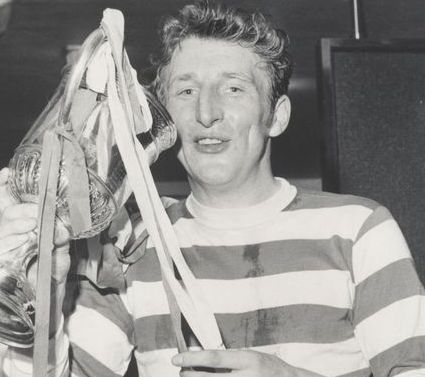
CELTIC TRIUMPHANT…Tommy Gemmell sips champagne from the newly-won Scottish Cup.
‘It was as though the board of directors waited until they saw what sort of crowd they had brought in for such-and-such a game before making their decision. I thought that quite odd when you considered that we were just about guaranteed a full house for every European game, irrespective of the opposition. However, that was the way the board went about their business back then. We did have a sliding scale for domestic trophies, but not for Europe. So, how much did it hit me in the pocket for losing to AC Milan? I still haven’t got a clue.’
Celtic had to accept the European Cup excursion was over and it was now all about concentrating on the league. Caviar was off the menu, it was now back to corned beef. It was always a stern test of character to see how certain individuals reacted amid such disappointment. Auld, a substitute against AC Milan, was one such character who would always meet a challenge and he was back in the starting line-up to face Partick Thistle in the next game. Murdoch was free from his midweek shackles to play his more recognisable role in midfield and Hughes came up with his own ideal response. The effervescent winger scored the only goal of the game for two vital points. Three days earlier they had stumbled in Europe, but his goal put them back on a reasonable footing on the domestic front.
A week later, Stein readied his troops for a Scottish Cup semi-final against the unpredictable Morton at Hampden. Once more it was demanded the Celtic players would have to display strength of character when the Cappielow side took the lead in only two minutes through Willie Allan, unguarded smack in front of goal. It was obvious this collection of Celtic players didn’t believe in making things easy for themselves. The fears of the fans, though, were allayed when Wallace levelled and then McNeill, playing the captain’s part to the hilt, headed in the second. Chalmers added a third and Johnstone a fourth to complete a 4-1 scoreline.

Now for the Scottish Cup Final at Hampden, due on 26 April, where Rangers were lying in wait. The Ibrox side had come to life in their semi-final against Aberdeen at Celtic Park when they hammered the Pittodrie side 6-1. It appeared the Govan outfit had neither forgotten nor forgiven the Dons for overcoming them 3-2 in the last game of the previous season to wreck their unbeaten league record.
Unusually, Celtic now had two Cup Final dates to look forward to at Hampden in April; the League Cup showdown with Hibs on the fifth and Rangers three weeks later. Harry Hood, always happy to admit his fondness for all things Celtic, got his long overdue move to the club. Stein parted with £40,000 for the skilful frontman to take him from Clyde and, like McBride, Wallace and Callaghan before him, he looked a shrewd buy. For a total expenditure of £127,000, the prudent Stein had brought in four players who would repay the transfer cash time and again. Hood was quick to get off the mark in the 3-0 success over St.Mirren.
Thankfully, there was no April Fool in evidence when St.Johnstone, Buck McGarry et al, returned to Parkhead on league business at the start of the month. Celtic had beaten their Perth rivals twice by the odd goal in the previous meetings and they followed the script by winning this one 3-2. Wallace, Gemmell and Hood, swiftly making up for lost time, were on target. Celtic broke off from points gathering to meet Hibs in the League Cup Final on a sun-caressed Hampden; the game being postponed from its original October date because of a fire in the main stand of the national stadium.
Bob Shankly, brother of Liverpool’s Bill, one of Stein’s great friends, had assembled a stylish outfit that was very easy on the eye. Bobby Lennox dismantled them in a one-sided final, netting a superb hat-trick in a 6-2 triumph. At one stage, with Celtic leading 6-0 near the end, Stein sent on substitute John Clark for Gemmell to lap up the cheers of the support. Hibs scored twice in the fading moments and Clark laughed, ‘Imagine that. I was on the field for such short period of time, the opponents score two goals without reply and I pick up a winner’s medal. Great game, this football.’
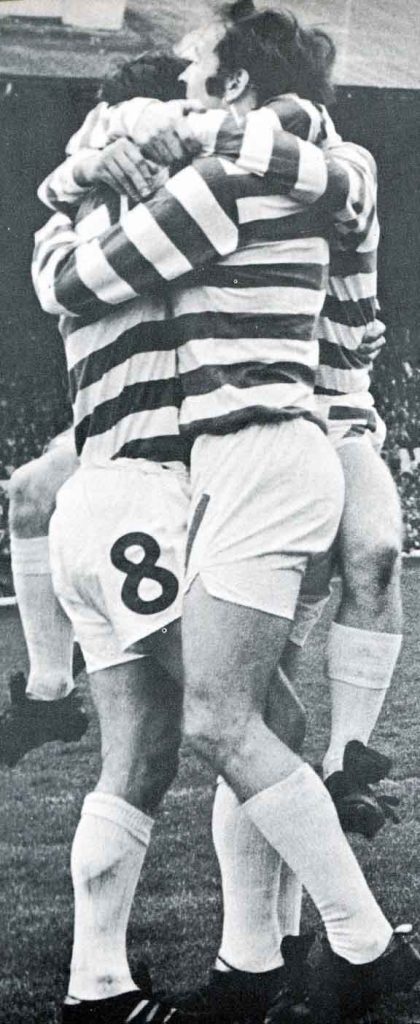
HOOP HOOP HOORAY…Harry Hood celebrates with Bobby Lennox (No.8).
Celtic prepared for the Scottish Cup Final with a strangely unsure performance against Airdrie at Parkhead and had to settle for a 2-2 draw with Lennox and a penalty from Gemmell gaining the point. ‘Maybe we had our eye on the Rangers game,’ admitted Gemmell. ‘At that stage, we were so close to clinching our fourth successive title and possibly we were a wee bit complacent. That wasn’t like us, I must admit. However, we knew we could make certain of the championship when we played Kilmarnock at their place a few days later. We needed a point and I’m glad to report I got the goal that gave us a 2-2 draw and our fourth successive flag. Frank Beattie had put through his own goal to give us our opener, but the Killie lads, as they always did against us, fought like their lives depended upon it.
‘I joined the attack once again and I remember the ball sitting up nicely and begging to be hit. I wasn’t going to disappoint it. I connected and it was a bit of a pulverising effort that zipped past their keeper into the net. Job done, but we would have to put the champagne on ice with the Cup Final due on the Saturday.’
Worryingly, John Fallon had kept only two clean sheets in nine games leading up to Hampden. Stein, realising Simpson may never overcome his persistent injury, signed Danish keeper Lief Neilsen, who completed the season by shipping sixty-eight goals in thirty-four league games at Morton. He never got anywhere near the first team. ‘People have often stated that if Big Jock had an Achilles Heel it was with goalkeepers,’ added Gemmell. ‘Certainly, he signed plenty, but never found a long-term replacement for Ronnie, who, of course, he had sold to Celtic in the first place. To be fair, Ronnie was a hard act to follow.’
Rangers had conceded so many points that there were to be no title dreams this time around for the Ibrox support; no heart-stopping run-in to the last day of the season. The bookmakers, those Rolls-Royce-driving gentlemen who favour cigars the size of rolled-up umbrellas, were rarely wrong in predictions and, for whatever reason, had Rangers just a shade ahead of Celtic as favourites to lift the Cup. Possibly, they were swayed by historic events because the Ibrox side had not lost a Scottish Cup Final in forty years.
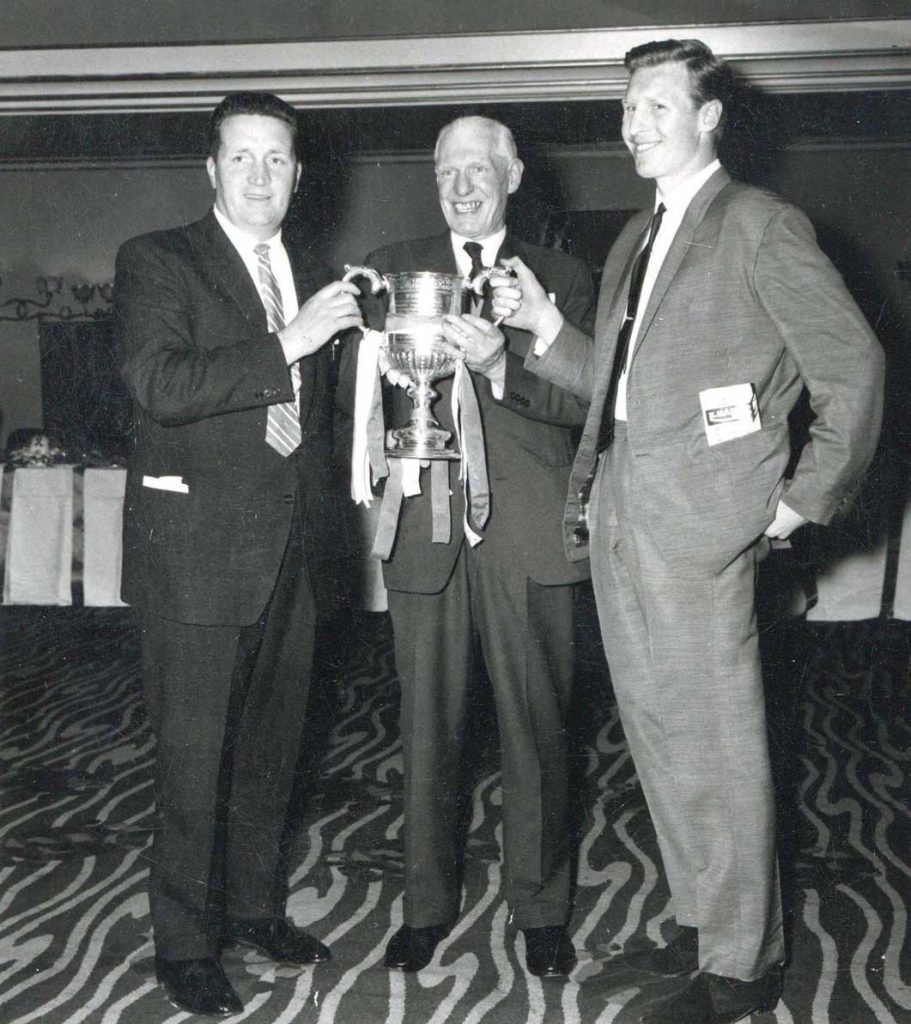
STUFF OF DREAMS…Jock Stein, chairman Bob Kelly and skipper Billy McNeill with the Scottish Cup.
Jock Stein would have to do without the skills of Jimmy Johnstone, who was suspended, and the injured John Hughes. Colin Stein, also banned for his onfield indiscretions, would be missing from the Ibrox team. Celtic went with this line-up: Fallon; Craig, McNeill, Brogan and Gemmell; Murdoch and Auld; Connelly, Chalmers, Wallace and Lennox. It was to be Alex Ferguson’s last game for Rangers. Like Jim Forrest and George McLean after the 1-0 Scottish Cup defeat in Berwick in 1967, he bore the brunt of a 4-0 massacre.
Celtic forced a left-wing corner-kick in the second minute and Lennox raced over to take it. The Rangers defence was still preparing itself, when Lennox floated over a tantalising cross. McNeill, as if on an invisible trampoline, leapt majestically into the air to catch the ball perfectly on his forehead. Time stood still for an instant. Martin was rooted to his line as the ball kissed the inside of his right-hand post and dropped gently into the net. Davie White had ordered Ferguson to pick up the Celtic captain at deadball kicks. The unfortunate Ferguson was left in McNeill’s slipstream as he stole forward before launching his header into the net.

Rangers, after just over 180 seconds, were in total disarray. A Jumbo Jet could have landed in the middle of their defence when Lennox – ‘I’m sure he was born fast,’ Danny McGrain was often fond of saying – burst into the open space and drove No.2 beyond a puzzled Martin. If the keeper was perplexed at that moment, it didn’t get any better as the clock ticked down towards half-time. He took a short goal-kick to Greig on the edge of the box. The Rangers skipper was far too nonchalant as he accepted the ball and tried to switch it to his left to McKinnon.
Connelly, anticipating the pass, stole the ball, swept away from Greig, strolled past the frantically-diving goalkeeper and rolled it into the empty net. The game was over long before Chalmers powered through on the left, arrowed in on goal, shaped to pass across the box to the lurking Lennox, then, with a deft change of foot, flicked the ball between Martin and his near post. Cue pitch invasion from raging Rangers fans as their counterparts, at the opposite end of Hampden, danced the afternoon away.
The final score of 4-0 in no way flattered Celtic. Stein, the old fox, had outthought and outwitted White. It had taken awhile, but this was the result he had fully intended inflicting on the Rangers boss on the second day of January the previous year. He realised that such a defeat would leave Ibrox in turmoil. He was right.
Questions would be asked and answers would be demanded. Ferguson was out, Martin would play only once more, Persson and Mathieson were no longer regulars and White was told there was precious little in the kitty for big-name purchases. Stein, always interested in events across the Clyde, would look back at that Scottish Cup Final as a job well done. Rangers endured a second barren season.
Now they knew how Celtic felt at the start of the sixties.

* TOMORROW: Don’t miss the third part of ‘TROUBLE IN PARADISE’, another dramatic instalment from Alex Gordon’s book, ‘CELTIC: The Awakening’– only in your champion CQN.

